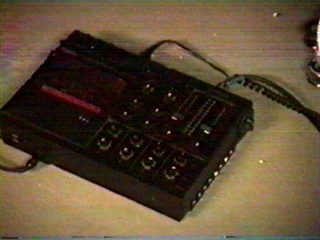
I have boxes of audio cassettes that I can no longer play because all of my cassette players are broken. A lot of these old cassette tapes were just recordings of LPs (those were big black discs that look like oversized CDs, kids) which I've since replaced with wonderfully re-mastered digital versions. If that was all these cassettes contained I wouldn't mind just tossing the lot of them, but many of the tapes hold the product of years of home recordings. Playing guitar and composing songs is a long time hobby of mine and you're not going to find my stuff on Amazon or in the iTunes store (I removed the Bardic Circle podcast from iTunes in 2013). I can't just download new mp3s of my old stuff since it only exists on these tapes.
The tapes were created in various Fostex 4-track recorders over time (I still use a Fostex, but the more recent digital model with a hard drive). The old cassette recordings made in the X-15 played at standard cassette tape speeds (though there was an adjustment knob which could be used to record at a slightly different speed either faster or slower), but at some point I got a newer X-18 deck which recorded at a faster speed (using more tape for better audio quality) with the result that those tapes aren't directly playable in a standard cassette deck. Attempting to do so results in only tracks 1 & 2 playing at a fast speed. The tape can be flipped to play tracks 3 & 4 which whiz by in reverse.

Before all of my tape decks went defunct I managed to salvage some of their contents and bring them forward into the digital realm. More recently no longer having a working 4-track player I was able to use a standard cassette deck to play the tapes forwards to digitally record tracks 1 & 2, then flipped the tape and recorded the other two tracks (3 & 4) backwards in order to recompose them digitally. This not only involved reversing the recording of 3 & 4 (trivial), but setting the recordings to the right speed (not straightforward to determine), and then syncing them up properly (tricky). For most of these personal recordings such a time-intensive salvage operation doesn't seem worth the time it will take.
Bringing the audio forward in this way is tricky also because its easy to end up with a mixed stereo track and NOT separate tracks, which means what you have digitally is NOT as good as what you had on analog tape. Where I was able to control the mix and gain on each individual track on the analog tape machine, if I don't do it correctly I could end up with tracks that are permanently "mixed" and no longer adjustable.
This is actually a problem for everyone
Mechanical obsolescence causing information loss is a common side effect of the modern technological age. The home video recordings of millions that were taken before digital video cameras arrived on the scene will likely end up lost as the big bulky video recorders break down and get tossed before the tape's contents can be "brought forward". These old video cassettes, currently languishing in drawers and boxes wait for the day probably soon to come when someone will find them and, being unable to determine the importance of their content, decides its not worth trying to restore them right before they end up in the landfill. Doctor Who fans may be familiar with the loss of 100+ episodes from the first and second Doctor when the originals were taped over (they were recorded on early video tape which was expensive and the decision was made to re-use the tapes) but many other shows have been lost in a similar manner but for their lack of a fan base - are just lost to history. Older super 8 home movies are in this class as well.
Besides the LPs which still take up a significant portion of real estate on one of my bookshelves though I haven't had a working record player in 15 years, I have a bunch of "carts" (essentially 8 track tapes) from when my brother was on the college radio station - same problem. My dad's old reel to reel tapes (not sure who has those now) have certainly been unplayable (by us) for many more years. I have a crapload of 3.5" disks when I don't own a single computer with a floppy drive. The 3.5" floppies were fairly easy to bring forward - at some point I copied what I wanted to keep to a hard drive and over the years have kept or culled this data. Audio and Video is more time consuming. You usually have to play the content in real time and capture it digitally - this, assuming you have a working player, a way to connect the devices together, and appropriate capture hardware / software. Not trivial for the typical home user.
Once the data makes it into digital form its more fungible. I'm not sure I can use that word in this context, but what I mean is that once your data is digital you can move it more easily to another platform or player. A cassette tape can only be read in a cassette deck, but that audio moved to the digital realm is now playable in a multitude of platforms, and audio and video formats are documented and softwares to read them can be re-written even if the old hardware can't be easily re-constructed. A good example of this includes old ROMs from arcade games which are still playable despite the original hardware they were written for is long gone.
Its the hardware!
Media's Achilles heel is the hardware on which its recorded or played. Mechanical devices have moving parts and are subject to the vagaries of environmental factors (shaking, dropping, heat, electric spikes). Data can be copied easily to new media and brought forward, and software players are easier to make than hardware players. The trick is actually doing it (bringing the media forward) before the original hardware to play it dies. After that your only recourse is to find an old working player, fix one up yourself, or bring it to someone who cares enough about the old technology to keep one working.
More reading on Digital Obsolescence



